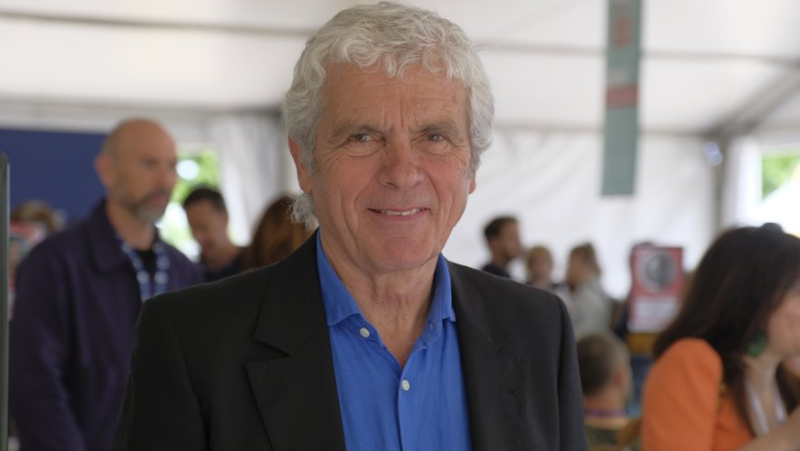Meeting around the poems of Claude Sérillon in Nîmes: “When we start to whisper, we convey more feelings”

Claude Sérillon : “Je regarde l’actualité en essayant d’y trouver de la beauté.” Midi Libre – GIACOMO ITALIANO
La Maison théâtre des littératures à voix hautes à Nîmes accueille Claude Sérillon, journaliste mais aussi poète édité par une maison d'édition nîmoise.
How did you meet Bruno Doan, the Nîmes publisher of your poems?
I met him through the architect François Fontès. Both of them read my texts and offered to edit them. I had seen what Bruno Doan had done with Atelier Baie, beautiful books on art, travel, discovery, particularly in Occitania. He wrote a remarkable book on Bernadette Lafont… He offered to lay out and edit a first work, then the second.
We knew you as a journalist before discovering these poems. How did you move to this register ?
It’is progressive. The collection of short stories L’Extravagant, that I have just published, is my 25th book. I started by doing tests that were closer to the profession of journalism. Then I wrote a novel, a dictionary… I wrote down a lot of things in notebooks. Quite naturally came the desire to put this in the form of poetry. It came little by little, it allows me to convey emotions, feelings, anger, more intimate moments where I look at the news trying to find beauty in it.
What place does poetry hold in your reading ?
It's one of those books that you can keep, you take it, you read two or three poems, you put it down, you never read it all. Prévert, for example, is a means of escape that I love, it’s full of humor, winks, mischief, tenderness. Sometimes, I read fables by La Fontaine, but also Desnos, René Char. I also like the classics like Verlaine or Apollinaire, but I like discovering more recent poems.
In "Agree to meet", you write "Whispering is an art, a tender politeness". This is your definition of poetry?
When you work as a journalist, especially as I was able to do on television, you speak loudly, you have a permanent amplifier, millions of people listening to you. And very often when we speak loudly, we speak simply, tersely, a little superficially.
When we start to murmur, to whisper, to have a conversation in a calm voice, we convey many more feelings, doubts, and questions. This attaches more to the soul, inside each of us.
What place does automatic writing have in your work??
There is definitely a part. I have long been quite fascinated by the Nouveau Roman, surrealism. As journalism taught me to be rigorous, to make subject verb complement, it’s a mixture of genres.
If I chose from the book Make an appointment, to write without punctuation, it’s because I want these texts to be said or read in a personal way. Everyone will put in the breathing, the stopping time, the caesura that they want. It’s a poetry that is available to everyone.
For you, poetry is the place of rebellion ?
That's not wrong. There are times in journalism when we must maintain a certain rigor. Poetry allows you to free yourself. We write things as we feel them and everyone draws from it what they have in common with you. It brings out extreme feelings.
There is also a lot of sensuality in your texts…
Humanity must convey sensuality. We must want to look at each other, touch each other, kiss each other, say words to each other that are important. It’s something that sweats a lot.
We also feel the importance of natural elements…
I had part of my childhood in the countryside. I am very attracted to nature, living things in general, that is to say both us humans, trees, insects, butterflies and birds. This fascinates me by the capacity for resilience that this allows. I very often observe that nature teaches us attitudes, resistances that can serve us.
Gaza, Charlie… From time to time, news arises…
I try to make the link between our job of observing the world, without masking our subjectivities. I can't help it, we can't live completely outside. There are wars, inequalities, tragedies or enthusiasms that occupy our eyes and ears. When we write, it must exist inside our sentences.
You were part of the Hemingway Prize jury. What did you think of the new winner "To the city and to the world" by Fabien Penchinat ?
I was one of the members of the jury who very simply and directly supported him from the first round. It’s a very original short story, full of humor, full of culture. It’s funny, relevant, a little satirical, mischievous.
Thursday May 23, 7 p.m. House theater of literatures out loud, 26 rue de la République, Nîmes. 10 €, 6 €. 06 17 53 02 60. I subscribe to read more




